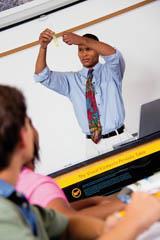Consultation on the revised programmes of study at Key Stage 3 closed 30 April. The Qualifications and Curriculum Authority (QCA) is offering a less prescriptive curriculum that could be tuned by teachers to meet the needs of all students. What does this new found freedom mean for science teachers?

The latest revision of the Key Stage 3 science curriculum (see Educ. Chem., 2007, 44 (2), 35) was partly a response to a growing dissatisfaction among teachers that the current programme of study is too prescriptive. The QCA provides a 'non-statutory' scheme of work, covering physics, chemistry, biology, environmental and Earth sciences and astronomy, and teachers tend to follow this or face interrogation from Ofsted as to why they do not. Another criticism of the QCA scheme of work is that it doesn't encourage teachers to develop new materials or use different exemplars.
The other driving force to the current changes is that Key Stage 4 has been revised to incorporate 'how science works.' According to QCA, the revised KS3 programme of study represents a shift in emphasis away from content towards scientific process and how science works. Knowledge of conceptual and factual information is important, it states, but the range and content statements are now more open to interpretation. The development of skills gets parity of esteem with subject-based knowledge.
Unlike the KS3 programme of study, however, that at KS4 has been used to develop 'subject criteria', which have been used by the awarding bodies to develop specifications - ie what teachers teach to. From a chemistry perspective, the areas to be studied at KS3 remain essentially the same - particles, acids and bases, reactions of metals, the development of the Periodic Table - all of which are mainstream chemistry and will provide students with the right background for further study. But what they teach and how far do they go into the subject is not clear. Moreover there is currently little information on assessment, specifically about what will be tested, and so some teachers might just be concerned about their new found freedom.
Colin Osborne, education manager, schools and colleges, at the Royal Society of Chemistry (RSC), explained to Education in Chemistry, 'While we don't want QCA to be prescriptive in terms of what should be taught, we would like them to give some guidance of the kind of things teachers should do, particularly in delivering "how science works" at KS3. There needs to be a range of exemplar materials and possible learning tasks that teachers can select from. These should reflect both the nature of science and also modern contexts that young people can relate to. Teachers need to know what the constraints and the freedoms are, and at the end of the day, what the assessments will be'.
A potential danger in not having any guidance, according to Osborne, is that teachers will either use what's in published schemes, which may not be the most interesting and valuable way of doing things, or they will do what they have done before and an opportunity for developing the curriculum will be missed. The RSC is particularly keen to see the science curriculum delivered through contemporary contexts, such as modern applications of the elements and climate change. 'While there are certain aspects of climate change that can be taught in geography - the effects on landscape for example - it makes sense to teach the reasons why climate change is happening and the interpretation of some of the data in science', says Osborne. 'And it's a good example of how science works', he adds.
In response Peter Slade, programme adviser for science at QCA, told Education in Chemistry, 'The range and content section of the programme of study outlines the breadth of the subject on which teachers should draw when teaching the key concepts and processes. This section is not to be taught in isolation. Currently, KS3 teachers need to be aware of the transition from KS2 so that work covered is not simply repetition of that covered in primary schools, and they also need to be aware of the breadth and depth that needs to be covered in order to allow appropriate progression onto KS4. This is no different with the new programme of study. In addition, the support and guidance materials provide information on continuity across the Key Stages, highlighting what pupils cover through Key Stages 2, 3 and 4. By reviewing all the programmes of study together we want to encourage schools to improve coherence across the curriculum and make connections between subjects'.
According to Slade, QCA is working with the National Assessment Agency (NAA) to consider how the tests can reflect the changes in the programme of study. QCA is also producing APP (Assessing Pupils' Progress) materials for science in a similar format to those produced for English and maths. 'These materials', said Slade, 'will allow teachers to make ongoing formative assessments of pupils' work and will provide opportunities to address aspects of the programme of study, such as communication skills, that cannot necessarily be assessed through conventional testing methods'.
The new focus on personal learning and thinking skills in addition to the key skills will be welcomed as part of the package to encourage pupils to becoming independent learners with the provision that these are directed by the teachers. The RSC will welcome attention given to 'curriculum opportunities', in particular where it gives indications that pupils have to prepare to specialise in a range of science subjects to KS4 and consider the career opportunities that are provided by science qualifications both within science and other areas, ie careers where a scientific training would be useful and valuable.
The new programme of study is expected to be implemented from September 2008 with first tests in 2011.






No comments yet